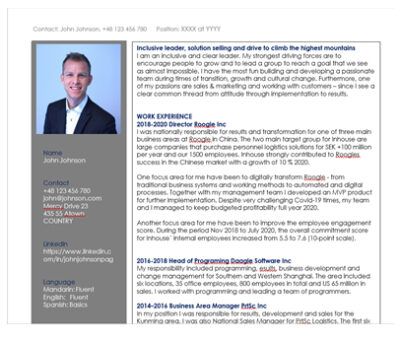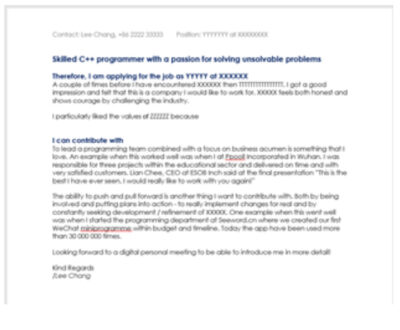10 best tips to get your job abroad
Here we offer reading fed with information on how to become better at applying for and getting a job in Europe! Do not just read the text, follow the tips at once. Test yourself, make notes and note down ideas you get while you read. Good luck!
Tip 1. Think first – then search
Put the energy into looking for the job you really want. Do not send the same application documents to all vacancies you find. The employer notices that you applied casually and your application probably does not radiate that you are passionate about getting this job. So start by thinking through what you want – and can.
What do you really want? Spend time on this, it pays off! Start by writing down what you want and then motivate why. Also formulate what you do not want.
I like / want / do not want – Why:
I want to work with people – I get mad from sitting alone in an office for a whole day!
I like to help – It makes me feel good.
I want to work in a grocery store programming department – I like to find solutions and to work with a computer to solve a problem for a customer or our company.
I do not want to work in healthcare – I have a spray phobia. Can not see blood.
And so on. This list can be as long as you like. By doing this job, it will become increasingly clear to yourself what you really want. And then it will be easier to make really good applications.
Map yourself – what makes you the right person?
Now you have to map yourself. What do you have that makes you the best for the job? Even things that are not jobs and educations can be very useful. Of course for you who are new to the labor market, but also for you with good qualifications. For example, have you played elite sports? Not many have managed that. It shows that you are persistent, able to take instructions and cooperate, and that you are determined. It certainly impresses the employer more than if you, like 90 percent of other applicants, have studied economics.
So make a list of your experiences and characteristics. And think about what the employer can benefit from it.
Much like this: (has done = benefit to the employer)
Passed Programming Training = Easy to learn, can speak several different programming languages
Worked in an office for two years = Can work with bookkeeping, controlling tasks and VAT. Good at working in groups.
Chinese sports blogs = Passionate about writing and spreading a message.
Bring everything!
In this mode, you should make a gross list. Do not censor. Bring everything you can think of, big and small. The next step is to think about what should be included in your application. Feel free to ask someone you know how they perceive you, it can be instructive.
Tip 2. Create a CV and cover letter with or without expert help
Create a CV based on a clear template that works for the country and the business where you are looking for a job. You can create this all by yourself and get help with fine grinding at a later stage.
Good CV headings:
- Personal information
- Objective
- Personal profile
- Work experience
- Achievements at work
- Education
- Other qualifications / or Non-profit work
- Language skills
- Computer knowledge
- References
Example

Tip 3. Create a Cover letter with or without expert help
Create a cover letter that is directly adapted to the specific market and country where you are looking for a job. Be relevant and answer these three questions:
- Why are you interested in working in this specific company?
- Why are you interested in working at this specific position?
- What can you bring to the position that will be beneficial for the company?
Example

Tip 4. Embassy contact / Dual Certification
Contact the correct country’s immigration authority / application case officer at the Embassy in China to get a dual certification of your documents. You can find contact details and how to do it at the internet or baidu.cn.
Tips 5. Culture and language
Prepare for how the country’s work culture works. Also, be sure to practice your English before the video interview. Also make sure that the CV, cover letter and digital presence on the Internet are linguistically correct. If you are uncertain, ask a friend or a company to help you with this. Among other companies there are translation companies all over Europe that would be happy to assist you.
Tip 6. Be relevant throughout the search process
An employer only wants to read what is relevant to her. Otherwise, this loses interest immediately.
Think about which company you are applying to, think about which person you will meet in the search process
This affects everything from how you apply, how you formulate yourself in your CV and personal letter, how you behave at the interview and how you follow it up.
Tip 7. How do you create a digital profile on the internet, including on linkedin?
The first thing a company does when they get in touch with you is to check your digital presence on the Internet. Linkedin is often the first step for many employers in Europe when looking for more information about a person who lives outside the borders of the country in question. For example if you live in China and are looking for a job in Germany or Sweden.
Tip 8. Most job vacancies are hidden jobs
Use your network. If the network is limited, you can start building your network through other contacts, job coaching companies or through Internet channels. There’s an abundance of companies in Europe that can help you with optimizing your Internet network and how to communicate on the different platforms like Linkedin, Careerbuilder or Eures.
Tip 9. See the interview as an important job meeting
The purpose of the interview is to see if you are the right person for the job.
So prepare well. Then the nervousness also decreases. Check out the company. Not sure what to wear? What style do you think they have? Can you find someone who knows someone who works there, who can come up with some info?
Prepare for the digital interview by interviewing a friend or expert. Important details are lighting, sound and rooms and of course how you convey your most prominent qualities and experiences.
It is also important to prepare your sales pitch that answers the question “Tell us a little more about who you are” and “What is the reason why you applied for the job”
Tip 10.
Get a good coach who knows the market where you are looking for a job
A tutor will help you figure out what you really want, and a plan for how to get there. You get help to make contacts, learn to write a CV and lots of other useful things.

